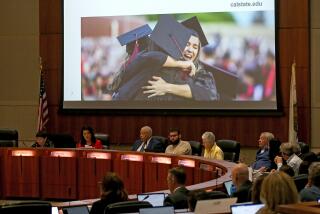Occidental, USC and sexual assault
Occidental College and USC — both of which have been under federal investigation in connection with their handling of sexual assault cases — have now acknowledged underreporting the number of incidents that took place on their campuses. That’s disturbing, even if, as both schools say, the underreporting was due to a misunderstanding about whether they were required to report anonymous complaints.
The disclosure that the numbers were substantially lower than they should have been — 13 fewer at USC and 24 at Occidental — comes at a time when frustration and anger are growing nationally over the issue of sexual assault on campuses. Given the widespread allegation that colleges and universities are mishandling rape and assault cases and dealing ineffectively and insensitively with victims, there is significant reason to be concerned about the validity of the numbers reported under the requirements of the federal Clery Act.
Both USC and Occidental said they would rectify the underreporting problem. But they also said they would narrow the scope of the assaults that would be reported. Occidental has decided to put in its Clery-mandated report only those sexual assaults that occur on its campus and adjacent public property, which is what the law requires. It had been including assaults that occurred in neighborhoods within walking distance, where students often live, which were within the boundaries of the campus safety escort program. From now on, assaults in those areas will be put into a supplemental report that will be available to the public. That seems like an acceptable change.
Meanwhile, USC had been telling students and parents that it would report any sexual assault complaints lodged at the school’s counseling center, and that they would be included in official crime statistics. But it was not, in fact, reporting all those cases. In the future, the school says it will officially claim an exemption under Clery that will allow it to keep to itself any assault complaints made at the counseling center, a step it says is necessary to protect the privacy of victims. Students who want an assault to be reported under Clery must make a separate complaint to campus safety officials or to the police.
But it would be wiser for USC not to invoke the exemption. A counselor reporting an assault under Clery may still keep the victim anonymous.
Privacy is obviously important for sexual assault survivors — and must be protected — but so is counting assaults on campuses. Sexual violence must not be swept under the rug, and the Clery Act is crucial to making sure it is not.
More to Read
Start your day right
Sign up for Essential California for news, features and recommendations from the L.A. Times and beyond in your inbox six days a week.
You may occasionally receive promotional content from the Los Angeles Times.






